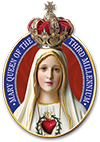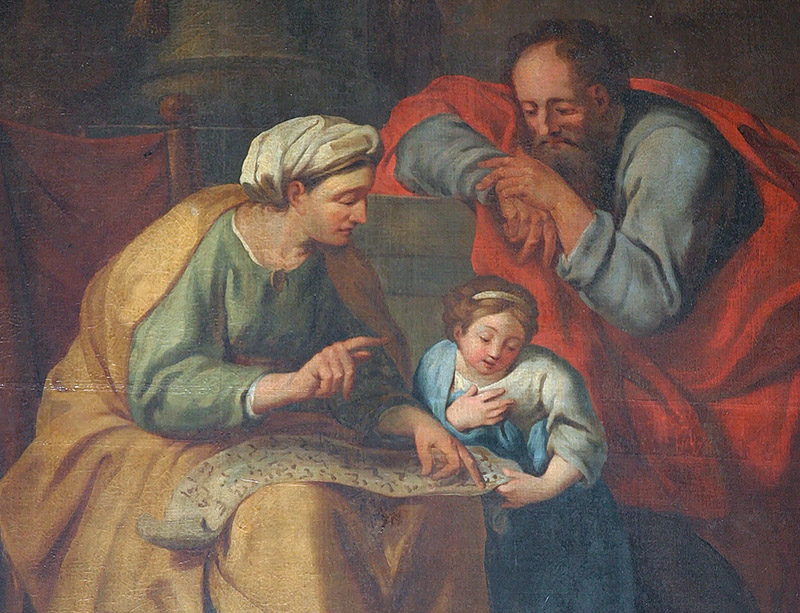St. Joachim and St. Anne, Parents of the Messiah’s Mother, Grandparents of God!
The Eternal Word wanted to have need of a Mother in whom He would take on human nature and, summarizing the whole universe within Himself (cf. Eph 1:10), repair our first parents’ sin.
From this perspective, Our Lady’s advent not only signified an enhancement of the work of creation, but its elevation to an unimaginable plenitude. The nativity of the Queen of the Universe initiated a new regime of grace for Angels and men, allowing God to establish His Paradise on the physical plane. From that moment on, He could “walk” in Mary’s soul as He had prefiguratively walked in the garden of Terrestrial Paradise when He spoke with Adam “in the cool of the day” (Gn 3:8).
And for the emergence, in time, of this Paradise painstakingly prepared from all eternity, the Divine Craftsman availed himself of two chosen souls: St. Joachim and St. Anne. To understand the singular gifts Providence granted them by virtue of their extraordinary vocation, we must recall certain fundamental theological presuppositions.
Cleansed of original sin and lavished with graces

After our first parents’ fall, the Creator established a covenant with Abraham and specified rituals that would sanctify his descendants, cleansing them of the guilt of original sin and mitigating its consequences. In this way He formed a holy people for Himself, from which the Man who was the centre and summit of history would be born – Jesus Christ. Now, in the divine mind, Our Lady was inseparably united to Him, being the masterpiece of the Most High and partner in the redemptive work of His Son.
The Father applied an altogether special care in preparing the birth of Mary and, in a certain sense, dedicated more direct and diligent attention to her entry into the world than to the birth of the Child Jesus. This was so, firstly because it was more in keeping with divine nobility to behave in this manner with a more fragile and delicate creature. And, secondly, for the simple reason that the most important and fundamental factor for the accomplishment of the Incarnation was Our Lady’s existence. With Her on the face of the earth, the Most Holy Trinity could, as it were, “rest assured” about the remaining details.
As true Israelites, Joachim and Anne had been, in due course, cleansed of original sin and lived in the state of grace. But the grandeur of the conception of the Mother of the Messiah required that they be raised to a degree of holiness and purification never before attained. Therefore, they had to be endowed with very particular gifts and virtues.
Moreover, in what concerned the Child’s constitution, it was fitting that Anne possess a holiness even greater than that of her husband, since she would become the living tabernacle of the Queen of the Universe. But God also adorned Joachim with eminent virtues, for they would be the principal inheritance he would bequeath to his Daughter. In a way, the couple’s mission surpassed that of the Angels themselves, for never did Our Lady address one of these as “mama” or “papa”…
The effects of proximity to the Mother of God and her Son
The Angelic Doctor explains that the closer one is to a cause, of whatever kind, the more one partakes in its effect. Applying this principle to Christ, the Font from whom all grace and truth flows (cf. Jn 1:17), those who are closest to Him benefit more from the fruits of His Incarnation, Death and Resurrection. This proximity, however, can be considered in two different aspects that are do not necessarily exclude each other: one based on blood and family ties, and the other, on complementarity of mission.
In Mary, both aspects are present in a unique way, since, by the Divine Motherhood She contributed to the formation of the most perfect Body of her Son and, as the Co-Redemptrix and universal Mediatrix of all graces, She was associated with the work of salvation He accomplished. For this reason, Our Lady was the one who most fully benefited, ante previsa merita, from the Redemption, being free of any stain of sin and full of grace from the first instant of her conception.
Something similar occurred with St. Joseph, as the Author explained in another work. Although the Glorious Patriarch offered no biological contribution to Jesus’ conception, his unique physical proximity, as the virginal father of the God-Man and true spouse of Mary Most Holy, likewise afforded him a sui generis participation in the effects of the Redemption.
After reviewing these fundamental principles, the question inevitably arises: what happened with the holy Anne and Joachim? The Gospels tell nothing about them, and even fail to mention their names. Yet, they are the parents of Our Lady and the grandparents of Jesus! … Could there exist closer and more intimate blood ties? What, then, were the effects of grace on the holy couple in view of the conception of Mary, the Immaculate? A passage from the Old Testament may help to answer these questions.
The example of Tobias and Sara
Sacred Scripture minutely narrates the marriage of Tobias to his cousin Sara, a maiden of rare beauty (cf. Tb 7-8). She was the victim of Asmodeus, the demon of impurity, who had killed her seven husbands on the first night of their marriage. They had each approached her moved by passion and, therefore, interiorly distanced from God. Deeply distressed, Sara contemplated suicide, but resisted the temptation considering the grief this would cause her good father, Raguel.

Providence, however, was preparing an admirable solution for the case. Instructed by the Archangel St. Raphael, who accompanied him in human form using the name Azarias, Tobias would overcome the concupiscence of the flesh, exorcise Asmodeus, and marry Sara with a pure heart.
With the due consent of the parents, the marriage feast was solemnly celebrated. Afterward, having just entered the nuptial chamber, Tobias addressed Sara, saying: ‘Sara, arise, and let us pray to God today, and tomorrow, and the next day: because for these three nights we are joined to God: and when the third night is over, we will be in our own wedlock. For we are the children of Saints, and we must not be joined together like heathens that know not God” (8:4-5).
When the fixed time had elapsed, observed by both in fervent prayer, Tobias prayed to God before consummating the marriage: “Lord, Thou knowest that not for fleshly lust do I take my sister to wife, but only for the love of posterity, in which Thy name may be blessed for ever and ever” (8:9).
By his purity and obedience to the Angel’s counsel, Tobias exorcised his nuptial union and enjoyed a long life in Sara’s company.

The most chaste begetting of Mary, prelude to the divine vengeance
In the light of this fact, the question arises about Sts. Joachim and Anne. Considering that the most excellent qualities of the chosen people converged in them, in what pertains to both natural and supernatural gifts, with a view to the full manifestation of these qualities in Our Lady and in the God-Man, it seems reasonable to hold that they too, in an even more perfect manner than Tobias and Sara, were purified of the concupiscence of the flesh before Mary’s conception.
Moreover, since Our Lady is the universal Mediatrix of all graces – a mediation which, consequently, embraces the whole history of creation – would her own parents not be the first to benefit from this prerogative? This hypothesis presents itself as the most decorous and chaste mode of preparation for the dawn of Redemption, the Blessed Virgin’s conception being the break of this dawn.
the Author believes the work of Providence was completed in both of them on that occasion, so that concupiscence would in no way tarnish the couple’s spirits in the begetting of Mary. Thus, the most chaste conception of Our Lady would be the prelude to the vengeance upon the serpent, which God had promised in Paradise: “She shall crush thy head” (Gn 3:15).

